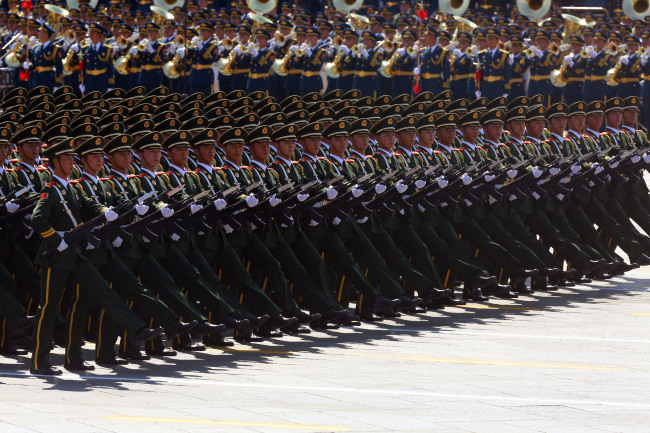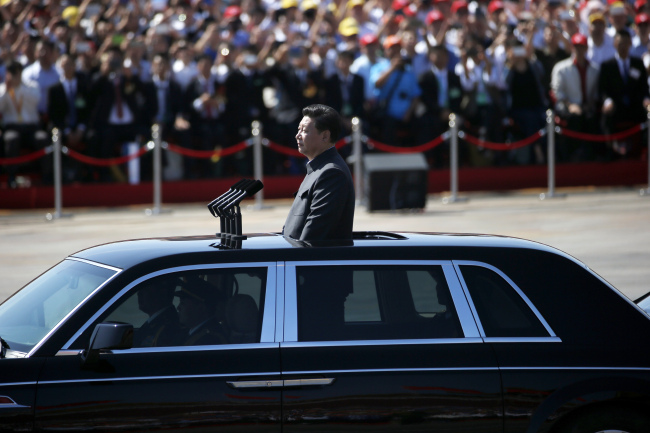Sino-U.S. rivalry a challenge for Korea’s diplomacy
Park’s attendance at parade raises prospect of Korea’s ‘bridging’ diplomacy, experts say
By 송상호Published : Sept. 3, 2015 - 18:03
Tiananmen Square on Thursday turned into a pomp-filled showcase of China’s military prowess, with the march of its goose-stepping troops leading a formidable display of intercontinental nuclear missiles, fighters, bombers, drones and other high-tech weapons.
During the much-anticipated military parade to mark the 70th anniversary of the end of World War II, Chinese leader Xi Jinping delivered a message of “peace and justice,” which was eclipsed by the massive presentation of China’s homebuilt combat assets.
During the much-anticipated military parade to mark the 70th anniversary of the end of World War II, Chinese leader Xi Jinping delivered a message of “peace and justice,” which was eclipsed by the massive presentation of China’s homebuilt combat assets.

At the parade involving some 12,000 troops, 500 military land vehicles and 200 aircraft, Xi vowed to reduce his troops by 300,000 and said that his country would never pursue “hegemony.” Yet, he called on the world to establish a “new type of international relations.”
“(All countries) should build a new type of international relations featuring win-win cooperation and advance the noble cause of global peace and development,” a proud-looking Xi said during his commemorative speech.
From the viewing stand, Xi, Russian leader Vladimir Putin, U.N. Secretary-General Ban Ki-moon and dozens of other foreign leaders watched the country’s largest-ever military parade, carefully choreographed to highlight its military ascent.
The most unlikely figure in the high-profile gathering that excluded leaders of U.S. allies and the West was President Park Geun-hye of South Korea, a longtime stalwart ally of the U.S., which is now in an escalating strategic competition with the emergent Asian power.
Well before she flew to Beijing, Park’s decision to attend the event became political fodder in and out of her country, sparking heated debates over whether her appearance alongside the leaders of the potential adversaries of the U.S. would serve South Korea’s national interests.
The intensity of the debates underscored the increasingly tricky foreign policy challenges facing Seoul, which has sought to maintain both the security alliance with the U.S. and strategic partnership with China, its crucial partner for trade, tourism and the denuclearization of North Korea.
Opinions of Park’s attendance varied.
Proponents said that Park’s attendance at the military event marked a major shift in Korea’s diplomacy that has largely prioritized its security alliance with the U.S.
“The Seoul-Beijing relationship has so far been dealt with within the confines of the Korea-U.S. alliance, which obviously posed impediments to furthering the Korea-China relationship,” said Suh Jin-young, professor emeritus at Korea University.
“Park’s participation in the military event obviously represented a substantial shift as it is a first major step for Seoul’s balanced, so to speak, diplomatic approach that goes beyond the remnants of the Cold War era.”
Opponents said that although Washington respected Park’s decision to attend the parade, doubts could deepen in the U.S. that Seoul might be tilting toward Beijing to cause a chasm in the South Korea-U.S. alliance, particularly when the emerging power is seen pursuing a regional leadership -- if not hegemonic -- role.

The military parade came at a crucial juncture as Beijing seeks to make the diplomatic and military landscape favorable to it ahead of Xi’s summit with U.S. President Barack Obama slated for later this month and the U.S. presidential election campaign next year.
“The parade is a multifaceted event to highlight China’s military, diplomatic influence particularly ahead of the summit between Obama and Xi. Xi might want to secure Obama’s recognition of his country’s influence,” said a security expert, who requested anonymity.
“After the U.S. election campaign begins next year, the overall situation could become unfavorable for China with some conservative campaigners bashing China. Thus before that unfavorable period begins, Beijing might want to further strengthen its influence.”
Intensifying Sino-U.S. rivalry
Park’s attendance at the victory ceremony drew keen attention as the event featuring China’s military advancement appeared designed to bolster China’s national pride and send a thinly veiled message of deterrence against its potential enemies, including the U.S. and Japan and those mired in escalating maritime disputes with China.
“Park, after all, could be seen as pursuing more autonomy in the U.S.-led network of alliances, by appearing at China’s military event, along with Xi and other leaders close to China,” said Nam Chang-hee, security expert at Inha University.
“I don’t see any serious problem with this, as Seoul might have explained or will explain unmistakably and sufficiently to Washington its intensions vis-a-vis Park’s visit to China. But Seoul should take some steps to reassure the U.S. that the bilateral alliance remains robust.”
The display of the weapons with greater lethality, accuracy, survivability and operational ranges gave a rare glimpse into how far China’s People’s Liberation Army has come in terms of its development of what the U.S. terms “anti-access/area-denial (A2/AD)” capabilities.
For the last 20 years, Beijing has invested significant resources into developing defensive and offensive capabilities to deny hostile forces, namely the U.S., access to its near seas or any operational areas within its inland or coastal regions.
From the HQ-12 ship-to-air missile to the DF-21D medium-range missile, dubbed the “aircraft carrier-killer,” a series of existing and new military platforms at the parade reaffirmed that China’s A2/AD capabilities have been evolving.
China is thought to have begun pursuing the A2/AD capabilities since the Taiwan Strait Crisis in the mid-1990s, in which the U.S. mobilized two aircraft carriers in a show of force against China’s saber-rattling against Taiwan that China thought was, then, leaning toward independence.
To counter such capabilities of China, the U.S. has been pushing to realign its force structure, develop new battle platforms, reshape military doctrines and strategies and strengthen its longtime network of security allies and partners that includes South Korea and Japan.
The U.S.’ efforts to handle China’s anti-access strategy have been impeded by its decade-old preoccupation with counterinsurgency and counterterrorism operations in Iraq and Afghanistan, the 2008 financial crisis and Washington’s hefty cuts in defense spending.
Yet the U.S. military has been pushing to develop a series of operational concepts to offset China’s evolving threats.
The most notable concept among them was the “AirSea Battle” involving the mobilization of aerial and naval assets to disrupt China’s intelligence-gathering assets and launch direct conventional strikes on China’s mainland. This concept has been renamed the “Joint Concept for Access and Maneuver in the Global Commons,” apparently due to the hostile connotation the AirSea Battle entails.
The AirSea Battle with its focus on the Air Force and Navy fueled an interservice rivalry, leading the Army and Marine Corps to create the “Gaining and Maintaining Access” concept to specify the role of ground forces to counter the A2/AD threats. This concept has been replaced by the “Joint Concept for Entry Operations.”
The two concepts are major components of the overarching Joint Operational Access Concept.
Washington’s struggle to develop such new warfighting concepts reflects its seriousness concerning Chinese threats, which have recently been magnified by Beijing’s growing assertiveness in maritime disputes involving the South and East China Seas.China’s ongoing moves to turn reefs and rocks in the South China Sea into artificial islands equipped with military facilities such as an airstrip and surveillance radar have further worsened the U.S.’ security concerns.
U.S. observers see China’s maritime assertiveness as part of its efforts to project power farther into the western Pacific -- at least around the “first island chain” linking Okinawa, the Ryukyu Islands, Taiwan and the northern Philippines. They, thus, believe China could endanger what they call the “global commons” or freedom of navigation and commerce at sea.
Sino-U.S. competition has been unfolding in other sectors as well, including the financial sector, as China is seen seeking to expand its influence to bolster its global status.
For instance, China’s initiative to establish the Asian Infrastructure Investment Bank has been seen as a move to alter the existing global financial order by challenging U.S. leadership of key international institutions such as the World Bank.
South Korea joined the AIIB last March after some eight months of a grueling decision-making process that involved its consideration of its decades-old alliance with the U.S.
Tough diplomacy for Seoul
Park’s efforts to restore trust with China culminated Thursday in her attendance at the military parade. Analysts said her participation raised the prospect of Seoul playing a “bridging” role between China and the U.S. to promote cooperation on a range of issues such as Pyongyang’s denuclearization.
“Park’s attendance at the parade showed that at a time of a power shift and growing uncertainties in the region, Korea can serve as a crucial medium to promote peace and stability in the region,” said Kim Heung-kyu, international relations professor at Ajou University.
“This time, Park can show that Korea can play a positive and constructive role to defuse and manage regional geopolitical tensions and bring the overall security landscape in the region in the direction of stability.”
Since her inauguration in February 2013, Park sought to enhance the relationship with China that worsened with the preceding Lee Myung-bak government focusing unduly on its security alliance with the U.S.
Amid repeated provocations by North Korea, Lee, for himself, had strived to restore Seoul’s ties with Washington, which were strained under the former Roh Moo-hyun government that stressed the need to make the relationship with the U.S. “more balanced and fairer.”
Park’s diplomacy toward China has triggered concerns among some observers here and in the U.S. that Seoul might be tilting toward Beijing, which might constantly seek to drive a wedge between the allies with a long-term goal of restoring its regional primacy.
Her trip to China this time reinforced the concerns despite Seoul’s behind-the-scenes efforts to reassure the U.S. that Seoul seeks to strengthen cooperation with Beijing to help address the North’s nuclear issue and promote the overall security in the region.
Apparently mindful of the growing concerns, the U.S. expressed support for Park’s trip, noting that close ties between Seoul and Beijing would help enhance security conditions.
“We believe that good relations among countries in the region promote peace and stability and are in their interests and in the interests of the United States,” Katina Adams, a State Department spokeswoman, told Yonhap.
The concerns about a possible dent on the Seoul-Washington relationship came as their alliance has been transforming into a multifaceted partnership from a security alliance that focused mostly on deterring North Korea’s aggression.
Analysts said the alliance should no longer be seen as a byproduct of the Cold War-era rivalry, but as a comprehensive system to enhance bilateral interests, and that Seoul’s enhanced cooperation with Beijing would, in the end, help ease the allies’ North Korea-related security burden.
“As NATO has evolved to undertake a broader security role to promote world peace, the Korea-U.S. alliance has also changed and matured to become a more comprehensive alliance,” said Kim Tae-hyun, international politics professor at Chung-Ang University.
“Caught in a U.S. versus China discourse, we should refrain from looking at the situation as a matter of a choice between the two major powers. We are living in a complex world where countries are interconnected socially, culturally, diplomatically and politically. People seem to only exaggerate the security aspect while failing to look at the whole picture.”
By Song Sang-ho (sshluck@heraldcorp.com)





![[Weekender] How DDP emerged as an icon of Seoul](http://res.heraldm.com/phpwas/restmb_idxmake.php?idx=644&simg=/content/image/2024/04/25/20240425050915_0.jpg&u=)



![[Music in drama] An ode to childhood trauma](http://res.heraldm.com/phpwas/restmb_idxmake.php?idx=644&simg=/content/image/2024/04/25/20240425050929_0.jpg&u=)







![[Herald Interview] Mistakes turn into blessings in street performance, director says](http://res.heraldm.com/phpwas/restmb_idxmake.php?idx=652&simg=/content/image/2024/04/28/20240428050150_0.jpg&u=20240428174656)
